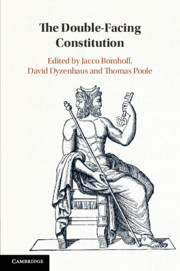(image source: CUP)
Abstract:
This collection explores some of the many ways in which constitutional orders engage with, and are shaped by, their exteriors. Constitutional and legal theory often marginalize 'foreign' elements, such as norms originating in other legal systems, the movement of individuals across borders, or the application of domestic law to foreign affairs. In The Double-Facing Constitution, these instances of boundary crossing lie at the heart of an alternative understanding of constitutions as permeable membranes, through which norms can and sometimes must travel. Constitutional orders are facing both inwards and outwards - and the outside world influences their interiors just as much as their internal orders help shape their surroundings. Different essays discuss the theoretical and historical foundations of this view (grounded in Kelsen, Hobbes, Locke, Rousseau and others), and its contemporary relevance for areas as diverse as migration law, the conflict of laws, and foreign relations law.Contents:
1. Introduction Jacco Bomhoff, David Dyzenhaus and Thomas Poole Part I. Theoretical Foundations:2. The Janus-faced constitution David Dyzenhaus 3. The idea of the federative Thomas Poole 4. Hobbes's Janus-faced sovereign Theodore Christov 5. Jurisprudential reflections on cosmopolitan law Evan Fox-Decent 6. From republican self-love to cosmopolitan amour-propre: Europe's new constitutional experience Alexander Somek Part II. Border Crossings: Comity and Mobility:7. The spectre of comity Karen Knop 8. Constitutionalism and mobility: expulsion and escape among partial constitutions Jacco Bomhoff 9. The inside out constitution Audrey Macklin 10. The constitution in the shadow of the immigration state Asha Kaushal Part III. The Foreign in Foreign Relations Law:11. Double-facing administrative law: state prerogatives, cities and foreign affairs Geneviève Cartier 12. The democratic challenge to foreign relations law in transatlantic perspective Helmut Philipp Aust 13. The double-facing foreign relations function of the executive and its self-enforcing obligation to comply with international law Campbell McLachlan14. The various faces of fundamental rights Dieter Grimm(source: CUP)


No comments:
Post a Comment
Note: Only a member of this blog may post a comment.